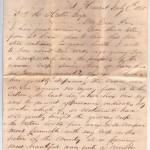In addition to the alternate ways of accessing formerly free NY Times content pointed out by Carrie Macfarlane in a previous blog post, I’d like to provide a bit of additional information about this popular resource. Continue reading
Tag Archives: collection development
Annual Special Collections Open House, August 31-September 2, 2010
PLEASE JOIN US FOR OUR ANNUAL SPECIAL COLLECTIONS OPEN HOUSE, August 31-September 2, 2010, 9 am-5 pm
On view in Special Collections, Davis Family Library, Lower Level
Faculty and Staff are welcome fo review our most recent acquisition of primary source materials incuding rare books and first editions, historic periodicals, manuscript collections, journals, diaries, antique maps, ephemera, etc.
Everything from the Illustrated London News to American travel letters to Victorian hair jewelry to NY Poet Frank O’Hara.
Special Collections materials are selected for their relevance to courses taught across the curriculum as well as for faculty research.
- Suggestions for future acquisitions are welcome.
- Tours of the closed stacks available upon request.
Please stop in anytime 9:00 AM-5:00 PM, Tuesday, Wednesday, Thursday, August 31-September 2, 2010
We look forward to seeing you.
Media Curator
Steve Bertolino has recently assumed the role of media curator for video collections housed in Davis Family Library, basically becoming responsible for the “care and feeding” of both the restricted and browsing video collections. Continue reading
LIS Collection Management has a new name!
With the merger of Collection Management and portions of Academic Consulting Services, it became clear that the area needed a new name to reflect its expanded scope.
I’m therefore pleased to announce that the name for this area is now Research and Collection Services (RCS). While many portions of the website still reflect the old names — and it will take a while before we’ve eradicated all remnants of Collection Management/Academic Consulting Services from the website, email distribution lists, HR/Banner information, etc. — please consider the name to be effective immediately. We’ll try to get the changes made expeditiously.
As a reminder, RCS includes:
- Reference and Instruction Librarians
- Special Collections
- Vt. Collection
- Government Documents
- Inter-library Loan
- Cataloging/Acquisitions/Serials
- Preservation & Processing
- Collection Development
Access to e-content: permanent or not?
We have online access to a large number of journals and newspapers. The terms governing our access vary considerably, and can change with the passage of time. One of the most important aspects of our access is the extent to which it is dependable and permanent. Following is an attempt to illustrate the range of stability of our electronic offerings.
The most stable and permanent situation is when we have a subscription with the publisher to a specific journal or packaged group of journals (e.g. Cambridge University Press, Oxford University Press, Taylor & Francis). In this case we have guaranteed permanent access to all material published during the years of our subscription. Often we will also have access to a backfile of material published before our subscription started. In some cases we are assured continuing access to this backfile, while in other cases ongoing access to any material dating from before the start of our subscription is not guaranteed. Continue reading
How We Build Collections
To cope with the recent economic decline, the College asked all units to cut operating budgets by 5% last winter, followed by news that FY10 budgets would at least be flat-funded, a de facto roll back. Since the library hasn’t experienced such deep cuts in decades–if ever–we thought it would be useful to state how we prefer to build collections in the midst of smaller fund accounts and modest prospects for budget growth.
By obligation, the Library collects information resources to support the curricular needs of the College’s academic departments. We strive to provide relevant materials for established programs and to assemble, to the extent possible, retrospective core collections for new College-sponsored academic initiatives. Collection subjects reflect the undergraduate curriculum, and collection developers are informed by class enrollments, intensity of use, new course offerings, and areas of study which must be supported by strong local holdings.
The primary way we build subject collections is by acquiring materials we think will be used by those teaching and taking courses presently offered by the College. This process is a year-by-year layering of new course materials upon older ones, perhaps best described as follows: in year one, professor X (in addition to her textbook order) submits requests to the library for books that augment required readings for a course she is currently teaching; in year two, professor X submits requests for additional books that further augment readings for this same course. Over the years, as X continues to teach this course, the library steadily shapes a collection around this curricular subject. We try to avoid the opposite approach, to expend large sums of money on a single course all at once, because creating an “opening day” collection means significantly reducing acquisitions in other subjects, and because by having sustained curricular activity drive collecting levels, we’re advancing collections incrementally according to needs of students and teachers.
–Joe Toth
a dream of one library…
Submitted by Mike Roy
I’ve started a blog called (following Tim Spears’ lead ) “Another Dean’s View” and recently posted a piece about cooperative collection development inspired by a recent meeting with my colleagues from other library’s in the northeast. The piece is called “The Dream of a Single Library” . I’m hoping this might serve as a springboard for conversations about our views on the future of our library collection in particular, and library collections in general.
– mike




You must be logged in to post a comment.